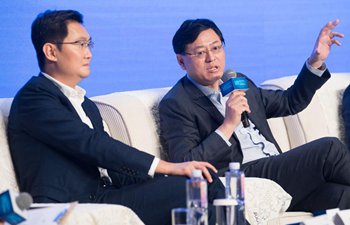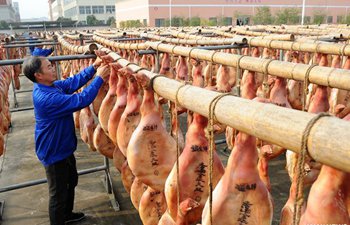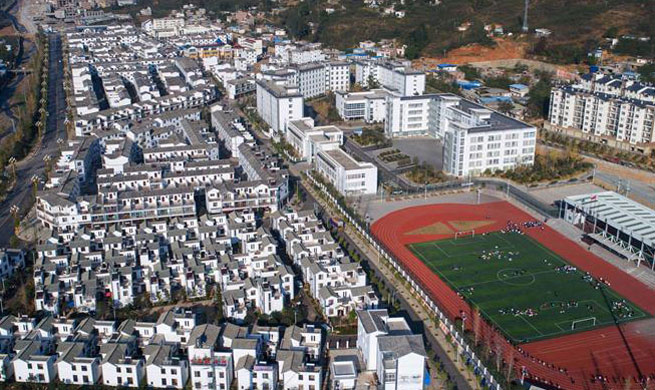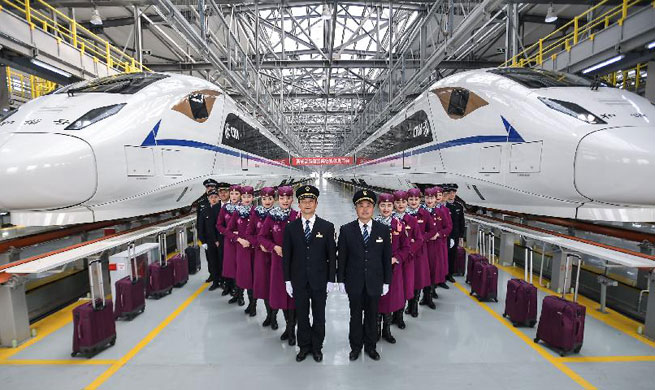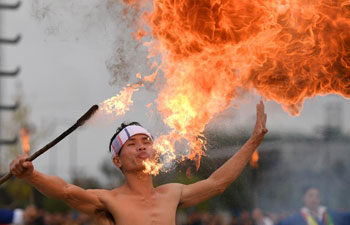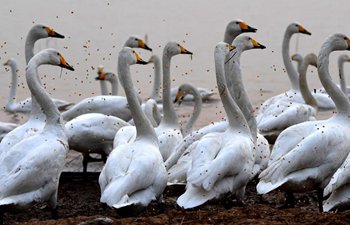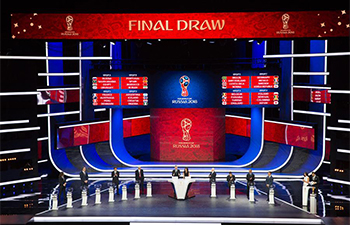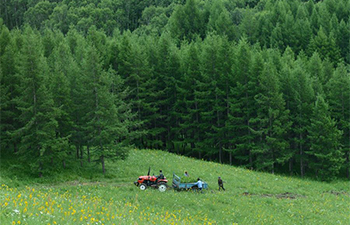ANKARA, Dec. 4 (Xinhua) -- Nowadays the hottest debate among Turkish sports world is about foreign footballers dominating local teams and its impact on the future of Turkish players.
A serious debate has been continuing since Turkey's National Football Team Technical Director Mircea Lucescu, who took the helm in August 2017, said it was difficult to select a national team player due to the small number of local players playing in the local League.
No league in Europe plays with as many foreign players as Turkey, according to Lucescu. The manager said young players chose to play abroad but they got limited time to play in the local games.
Since its foundation, Turkey's Football League has adopted similar practices to those the European soccer leagues, which lifted restrictions on foreigners. Turkey has long been struggling to find the right balance between domestic and foreign players and gradually increased the number of foreigners.
The Turkish Football Federation removed limits on the number of foreign players in teams of Turkey in 2015.
Under the previous rule, only five foreign players were allowed to play at one time and three non-Turkish players were permitted on the bench.
But under the current system, a Turkish Super League team is allowed to take to the field with a team entirely composed of foreign players.
Clubs are currently permitted to have a 28-man squad with 14 domestic and 14 foreign players. There is no foreign player limitation in the squad of 18 seats. In other words, if teams want to go to the field with 11 foreign players they can go out, but the match line up is required to include 7 local football players.
After the Federation introduced the new regulations, the changes had been mostly welcomed by the football community, since the prices for Turkish players and their yearly wages were astronomically high due to the small number of quality players.
Local footballers were criticized for asking enormous prices without working hard, living without discipline, and not sustaining their high performance for a long time owing to foreign restrictions.
The Turkish Football League has recently acquired world famous football stars after the abolition of the foreign footballer quota, which led the wages of local players lowered, helping some of the smaller teams.
Some football team administrators had argued that Turkish teams were now able to compete better with their European rivals.
But the outcomes of the decision have irked the football society. Fans raised eyebrows when Galatasaray fielded all players from foreigners in their game against Konyaspor on Oct. 14, a first in Turkish league history.
Some argue that the removal of quota on foreign players has harmed Turkish football and the national team as a result of new rules prevents young and promising talent footballers from getting crucial playing time to hone their skills.
President Recep Tayyip Erdogan, a former professional football player, last month said the issue of foreign players limit can be reviewed in 2019 when most foreign footballers' contracts are up.
The president defended that a complete ban on foreign players is irrational, but more efforts should be made to local players increase their skills.
The Turkish Football Federation mulls to limit the number of on-field foreign players to eight, Chairman Yildirim Demiroren said in November.
"With more foreign players, the quality of our league has improved. It has brought down the price of local players and filled the stadiums. But, we will discuss how we can increase the number of local players on the pitch in an administrative meeting. Maybe the number of foreign players on the bench could be reduced," Demiroren said.
Despite different views on foreign player quota, pundits agree that the main problem is about lack of continuously investing on infrastructure, in other words, about systematically raising young players.
The problem about capacities of local players has nothing to do with foreign restrictions, according to Mehmet Demirkol, columnist of Turkey's leading sports newspaper Fanatik.
"The problem here is the weakness of the competition power of these local players. The problem is they have grown lazy in a country with restrictions on foreign players," he states.
If the country is good in sports, then it brings up its children in the proper fit of global competition, not by running away from competition, Demirkol said.
Ugur Meleke, daily Hurriyet's sports commentator suggested that any foreign restrictions would not help national football human resources.
He recalled that by the end of the 2016-2017 season, 89 percent of Turkish clubs' revenues were spent on brokerage and salary items.
"Although we are paying 9 out of every 10 Turkish Lira in the box to the players, our sportive performance is not promising; we are the 19th in the national team rankings of European in the meantime. At the national level, we could not enter the last 16 of the European rankings for 10 years. I must remind you that 8 of those 10 years passed by foreign restrictions," he said.
The Turkey National Football Team in its history was able to participate twice in the World Cup Finals and three times in the European Cup finals. Turkey became third in the 2002 World Cup and reached the semi-finals of the 2008 European Championship.
Turkey failed to reach the World Cup 2018 that will be held in Russia next June.




